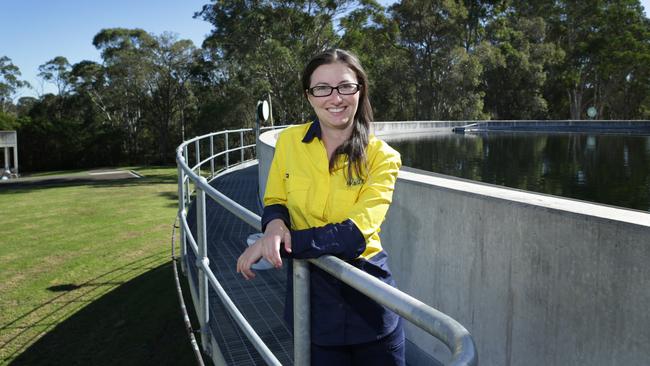Engineer a change in career
As the mining downturn continues, graduate engineers increasingly are turning to other industries for jobs.

As the downturn in mining continues, graduate engineers increasingly are turning to other industries for jobs, and programs such as Sydney Water’s annual intake are the winners.
Bonnie McKay, who heads Sydney Water’s people, leadership and culture department, says while the corporation always attracts top quality candidates to its graduate program, engineers who may have headed for the popular mining industry fields are looking for alternatives.
“The mining industry is struggling and they’re not hiring very much, and we find that we get more applications from Western Australia,” McKay says.
“Even when mining is booming we get applicants from all over Australia. Numbers go up when mining goes down.”
Sydney Water had about 1600 applicants for about 20 positions last year, and applications for this year’s graduate intake are open until April 15.
There is also a high number of women who apply for graduate engineering positions across a range of disciplines, with Sydney Water aiming for an annual 50-50 split between the sexes.
The federal Department of Education and Training’s uCube data shows that in 2013 there were 82,213 men studying engineering and related fields, compared with 15,619 women.
At the University of Western Sydney last year, McKay says, there were only about 200 female engineering students compared with 1300 male students, reflecting industry standards.
McKay says despite the low percentage of women studying engineering there are always strong candidates who apply for the graduate program.
“Girls do so well in school in maths and science but we see them drop off from school to university to graduation and we don’t know why,” she says.
“But we do get the dedicated female engineers coming through and they’re passionate about it.”
While many engineering graduates go directly into the marketplace without undertaking internship programs, there are benefits to additional training and being embedded in a company for several years.
Graduate programs and up to four years of additional worksite training generally make it easier for engineers to move up the ladder or obtain better jobs with higher salaries, and they can also undertake widespread training in different fields.
Many companies then promote from within, ensuring those four years of work can be put to good use at the same firm.
Those who do not stay are often people looking for a different experience, who are keen to travel, or even move interstate or overseas for love.
Hosting companies will often provide a detailed reference as well, noting practical experience.
McKay says the graduate program, which looks for chemical, civil, mechanical, electrical and environment engineers, and recruits one accountant, information technology and marketing and communications person, is popular because it is highly structured. The four-year program offers up to four rotations through different divisions in the organisation, with participants choosing their preferred areas.
“One year they can try out business strategy and the next year they can go to a treatment plant or an engineering area,” she says. “We have a fantastic work-life balance policy as well and, for our young people, they seem to want that.”
Sydney Water allows staff to spend nine days a fortnight in the office or work flexible hours.
It has a fitness program including classes for staff, and there is a focus on balancing life outside of the office and work.
McKay says the graduate program also offers a competitive salary with other industry offerings, undertaking regular market analysis to find out what it is going to take to attract the best and brightest.
“People feel they can make a difference because you can give back to the community and the environment,” she says. “What they do directly relates to turning on the tap or flushing the toilet.”
* * *
Graduate finds the chemistry is right
With her tongue firmly in cheek, Sally Rewell describes herself as the modern chemical equivalent of Jesus.
“I say I’m kind of like Jesus, turning sewage into water, as he turned water into wine,” Rewell says.
The former University of Sydney chemical engineering student was recruited into Sydney Water’s graduate program in 2010, and has challenged gender stereotypes, become a mentor and worked on representative committees in a career on the move. With a father and grandfather both doctors, Rewell decided she would buck the family trend and study engineering, choosing chemical engineering instead of some of the more male-dominated areas such as civil, electrical or other the building-related fields.
Chemical engineering ticked all the boxes because it was less about gender and more about science, practical applications and problem solving.
She applied for several jobs after graduating but chose Sydney Water because of the company’s flexibility provisions, and because it had been named the graduate program of the year at the time. She ended up specialising in the water recycling and treatment area, and now works at Sydney Water’s Rouse Hill plant.
“I was told by numerous males that I had worked with in the past as a student engineer and in my first rotation that young girls aren’t really cut out for the sewage treatment world and I like to prove people wrong,” she says.
Rewell has figuratively immersed herself in her work, joining the Australian Water Association, joining its committees, mentoring and helping organise annual water conferences.
She has begun a masters of engineering management at the University of Technology, Sydney, in a bid to broaden her skills.
She hopes she will be able to use the training she has gained during her short working life as she progresses up the corporate ladder.
“I’d like to move into a management position when I get some more field skills under my belt,” she says.
“I like working with people and solving problems and I like the facilitation.”
She also gets a kick out of mentoring undergraduates and program participants.
“When they start solving problems themselves and they step up, that gives me a thrill.”


